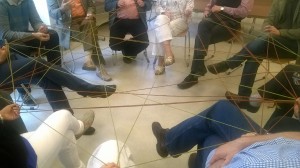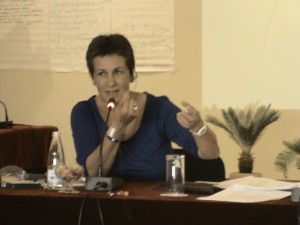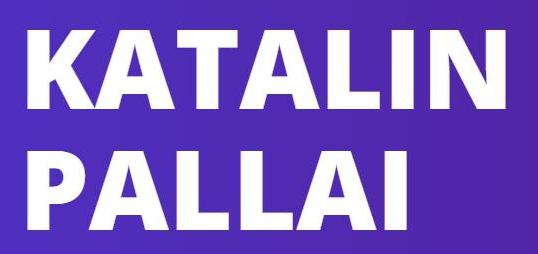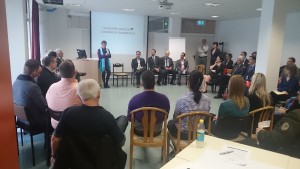Assertive communication and cooperative negotiation training, 2018
The training aims to develop participants’ competence in negotiation. It helps them to identify, understand and map causes of conflicts, and presents the principles and method of collaborative negotiation and conflict management. Due to the experiential teaching method, participants have opportunity to practice problem solving and conflict resolution methods in simulations of typical situations within their specific business environment.
Change management training, 2018
The training was designed and delivered for the leadership and managers of ADISA, the agency responsible for the delivery of public services in Albania. It aimed to raise awareness of the complexity of organizational change processes, offer approach and methods to manage effective change and create space for the managers to discuss and improve their own organizational practices.
Personal competence building for integrity advisers, since 2013
Integrity advisers are responsible for advising the head of public organizations in his/her work in strengthening the integrity of the organization. The main tenet of the integrity management approach is that the rules and the values of the organization need to be developed by a complex organizational development process that apply rule- and value-based instruments in balance. In the frame of a one year long post-graduate program beyond the necessary technical skills we must also develop personal competencies of the students for initiating and leading collective change processes of norm building and change, and for advising leadership. The some 100 years long personal competence building component that includes communication, trust building and persuasion, integrative negotiation and consensus building, and various techniques that can be applied in advising, consulting and in group processes.
Training of public ethics and public integrity trainers 2013-2018
Since 2013, in the National University for Public Service, the key provider of public ethics and integrity training for the Hungarian public service, I am responsible for the elaboration of training methodologies and the training of trainers who implement the training of students and civil servants in these domains. A research conducted about the activities in 2013-14 proved the effectiveness of this work by validating the methodology and trainers’ performance in bringing statistically significant changes in both the trainees’ attitude towards and knowledge of anticorruption. OECD Integrity-Forum-Katalin-Pallai
Leading collaborative process of complex curriculum and faculty development, 2014-2018
 This project is connected to the one described below, the Postgraduate Program for Integrity Advisers. Integrity advising is a new and complex field. Integrity advisers need to master not only specific technical skills but also need to strategize and initiate and support collective action processes. I designed a curriculum development process that was different from the usual academic process in three dimensions. The first was, that faculty could not transmit established knowledge about an established profession but had to create a new practice for a new professional field. This condition led to the two other new dimensions: one was a collaborative curriculum development process, and the other that the process happened across the traditional boundary between academia and practice. I involved three groups of professionals : academics, anti-corruption practitioners and professionals from the fields of organizational development and dialogic processes. I worked with the faculty through a series of faculty workshops with the aim (1) to offer own experience for faculty of a space for integrative dialogue, (2) to use the process for creating substantive synergy among the various subjects that are delivered by them, (3) to create shared norms and objectives not only for the delivery of content but also for the ethical stance faculty transmits to students, and (4) to build the methodological development of faculty on these own experiences. The process has not ended yet but it has already achieved a specific culture for faculty relations and for the education within the program, has impact on both the coherence of content and the diversity of teaching methods, and has engendered some new practices for integrity advising. Pallai paper WCCI integrity pedagogy
This project is connected to the one described below, the Postgraduate Program for Integrity Advisers. Integrity advising is a new and complex field. Integrity advisers need to master not only specific technical skills but also need to strategize and initiate and support collective action processes. I designed a curriculum development process that was different from the usual academic process in three dimensions. The first was, that faculty could not transmit established knowledge about an established profession but had to create a new practice for a new professional field. This condition led to the two other new dimensions: one was a collaborative curriculum development process, and the other that the process happened across the traditional boundary between academia and practice. I involved three groups of professionals : academics, anti-corruption practitioners and professionals from the fields of organizational development and dialogic processes. I worked with the faculty through a series of faculty workshops with the aim (1) to offer own experience for faculty of a space for integrative dialogue, (2) to use the process for creating substantive synergy among the various subjects that are delivered by them, (3) to create shared norms and objectives not only for the delivery of content but also for the ethical stance faculty transmits to students, and (4) to build the methodological development of faculty on these own experiences. The process has not ended yet but it has already achieved a specific culture for faculty relations and for the education within the program, has impact on both the coherence of content and the diversity of teaching methods, and has engendered some new practices for integrity advising. Pallai paper WCCI integrity pedagogy
Competence building for asset management supervisors, 2015
The program is designed to train those supervisors who will support families who, in consequence of borrowing, became insolvent. My part in the program is to design and lead the component responsible for developing personal competences negotiation and advising. The objectives of this personal competence building component are to develop the supervisors’ capabilities to understand and analyze complex situations of persons and families in crisis; enhance their emotional intelligence, assertive and non-violent communication culture and techniques, and their advisory competencies.
 Training of Leadership trainers for the Leadership Academy of the Council of Europe, since 2011
Training of Leadership trainers for the Leadership Academy of the Council of Europe, since 2011
The program offers nine month long education for local government leaders in partner countires. Since the begining of the program, I contributed to the curriculum development and to the training and coaching of local teams of trainers. I led the local adaptation and was responsible for the training of the local trainers in Bulgaria, Hungary, Ukraine, Lithuania, Albania and trained trainers from multiple other countries during the International Trainer of Trainers event.
Training of Local leadership trainers, 2011-2014
Within the frame of the Leadership Academy Program of the Council of Europe I trained the local leadership trainers of 6 participating countries and within the Local Councillor program implemented in Hungary by the Norwegian Fund I trained all Hungarian trainers.

